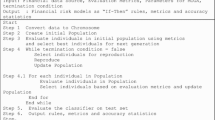Abstract
Credit scoring is the assessment of the risk associated with lending to an organization or an individual. Genetic Programming is an evolutionary computational technique that enables computers to solve problems without being explicitly programmed. This paper proposes a genetic programming approach for risk assessment. In particular, the study is set in order to predict, on a collection of real loan data, whether a credit request has to be approved or rejected. The task is to use existing data to develop rules for placing new observations into one of a set of discrete groups. The automation of such decision-making processes can lead to savings in time and money by relieving the load of work on an “expert” who would otherwise consider each new case individually. The proposed model provides good performance in terms of accuracy and error rate.
Access this chapter
Tax calculation will be finalised at checkout
Purchases are for personal use only
Preview
Unable to display preview. Download preview PDF.
Similar content being viewed by others
References
Cramer, N.L.: A representation for the Adaptive Generation of Simple Sequential Programs. In: Grefenstette, J.J. (ed.) Proceedings of an International Conference on Genetic Algorithms and the Applications, Carnegie Mellon University (1985)
Crook, J.N., Edelman, D.B., Thomas, L.C.: Recent developments in consumer credit risk assessment. European Journal of Operational Research 183, 1447–1465 (2007)
Davidson, J.W., Savic, D.A., Walters, G.A.: Symbolic and numerical regression: Experiments and applications. Information Sciences 150(1/2), 95–117 (2003)
De Stefano, C., Della Cioppa, A., Marcelli, A.: Character preclassification based on genetic programming. Pattern Recognition Letters 23(12), 1439–1448 (2002)
Durand, D.: Risk Elements in Consumer Installment Financing. National Bureau of Economic Research, New York (1941)
Faraoun, K., Boukelif, A.: Genetic Programming Approach for Multicategory Pattern Classification Applied to Network Intrusions Detection. International Journal of Computational Intelligence and Applications (IJCIA) 6(1), 77–99 (2006)
Frank, A., Asuncion, A.: UCI Machine Learning Repository. University of California, School of Information and Computer Science, Irvine, CA (2010), http://archive.ics.uci.edu/ml , http://archive.ics.uci.edu/ml/datasets/Credit+Approval
Goldberg, D.E.: Genetic Algorithms in Search, Optimization & Machine Learning. AddisonWesley (1989)
Jabeen, H., Baig, A.R.: Review of Classification Using Genetic Programming. International Journal of Engineering Science and Technology 2(2), 94–103 (2010)
Handzic, M., Tjandrawibawa, F., Yeo, J.: How Neural Networks Can Help Loan Officers to Make Better Informed Application Decisions. Informing Science 6, 97–109 (2003)
Koza, J.R.: Genetic Programming II: Automatic Discovery of Reusable Programs. The MIT Press, MA (1994)
Lahsasna, A., Ainon, R.N., Wah, T.Y.: Credit Scoring Models Using Soft Computing Methods: A Survey. The International Arab Journal of Information Technology 7(2), 115–123 (2010)
Ong, C.S., Huang, J.J., Tzeng, G.H.: Building credit scoring systems using genetic programming. Expert Systems with Applications 29, 41–47 (2005)
Schmidt, M., Lipson, H.: Distilling Free-Form Natural Laws from Experimental Data. Science 324(5923), 81–85 (2009)
Zhang, Y., Bhattacharyya, S.: Genetic programming in classifying large-scale data: an ensemble method. Information Science 163(1/3), 85–101 (2004)
Author information
Authors and Affiliations
Corresponding author
Editor information
Editors and Affiliations
Rights and permissions
Copyright information
© 2013 Springer-Verlag Berlin Heidelberg
About this chapter
Cite this chapter
Rampone, S., Frattolillo, F., Landolfi, F. (2013). Assessing Consumer Credit Applications by a Genetic Programming Approach. In: Proto, A., Squillante, M., Kacprzyk, J. (eds) Advanced Dynamic Modeling of Economic and Social Systems. Studies in Computational Intelligence, vol 448. Springer, Berlin, Heidelberg. https://doi.org/10.1007/978-3-642-32903-6_7
Download citation
DOI: https://doi.org/10.1007/978-3-642-32903-6_7
Publisher Name: Springer, Berlin, Heidelberg
Print ISBN: 978-3-642-32902-9
Online ISBN: 978-3-642-32903-6
eBook Packages: EngineeringEngineering (R0)




